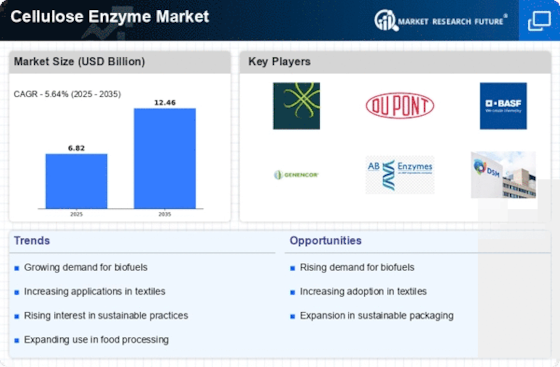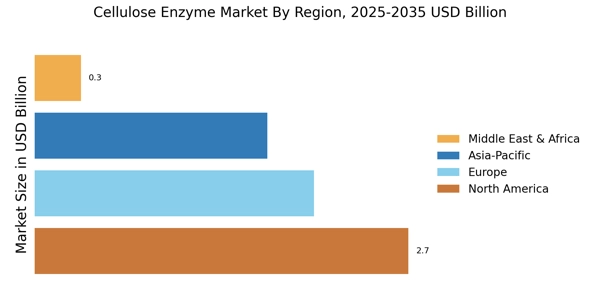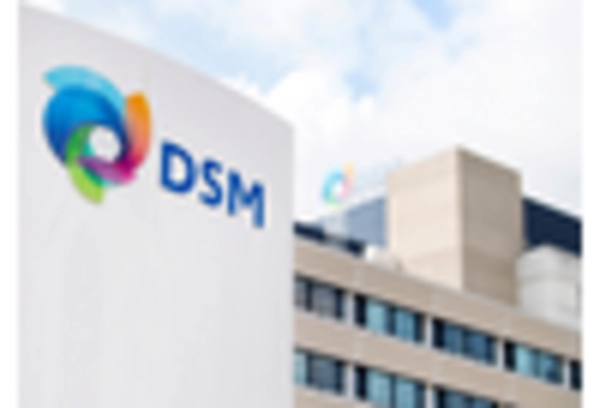Regulatory Support
Regulatory support for the use of enzymes in industrial applications is emerging as a significant driver for the cellulose enzyme Market. Governments and regulatory bodies are increasingly recognizing the environmental benefits of enzyme technology, leading to favorable policies and incentives for industries adopting these solutions. For instance, regulations promoting the use of bio-based products are encouraging manufacturers to explore cellulose enzymes as alternatives to traditional chemical processes. This shift not only aligns with sustainability goals but also enhances product safety and quality. As regulatory frameworks continue to evolve, the cellulose enzyme market is likely to benefit from increased adoption rates, as companies seek to comply with new standards and leverage the advantages of enzyme technology.
Sustainability Initiatives
The increasing emphasis on sustainability initiatives is a pivotal driver for the Cellulose Enzyme Market. As industries strive to reduce their carbon footprint, cellulose enzymes offer a viable solution by facilitating the breakdown of cellulose into glucose, which can be further converted into biofuels. This process not only enhances energy efficiency but also minimizes waste. According to recent data, the biofuel sector is projected to grow significantly, with cellulose enzymes playing a crucial role in this transformation. Companies are increasingly adopting these enzymes to meet regulatory standards and consumer demand for eco-friendly products. The shift towards sustainable practices is likely to propel the cellulose enzyme market, as more organizations recognize the benefits of integrating these enzymes into their production processes.
Technological Advancements
Technological advancements in enzyme production and application are significantly influencing the Cellulose Enzyme Market. Innovations in biotechnology have led to the development of more efficient and cost-effective cellulose enzymes, enhancing their applicability across various sectors. For instance, the introduction of recombinant DNA technology has enabled the production of enzymes with improved stability and activity. This has resulted in a broader range of applications, particularly in the textile and paper industries, where cellulose enzymes are utilized for bio-polishing and deinking processes. Market data indicates that the enzyme market is expected to witness a compound annual growth rate of over 6% in the coming years, driven by these technological improvements. As industries continue to seek more efficient production methods, the demand for advanced cellulose enzymes is likely to rise.
Consumer Awareness and Preferences
Consumer awareness and preferences for sustainable and natural products are driving the Cellulose Enzyme Market. As consumers become more informed about the environmental impact of their choices, there is a growing demand for products that utilize eco-friendly processes. Cellulose enzymes, known for their ability to reduce chemical usage and waste, are increasingly favored in various applications, including food production and textiles. Market Research Future indicates that consumers are willing to pay a premium for products that are marketed as sustainable, which is prompting manufacturers to incorporate cellulose enzymes into their offerings. This shift in consumer behavior is likely to encourage more companies to invest in enzyme technology, further propelling the growth of the cellulose enzyme market.
Rising Demand in Diverse Industries
The rising demand for cellulose enzymes across diverse industries is a key driver for the Cellulose Enzyme Market. Sectors such as food and beverages, textiles, and biofuels are increasingly incorporating cellulose enzymes into their processes to enhance efficiency and product quality. For example, in the food industry, cellulose enzymes are used to improve the texture and shelf life of products. The textile industry utilizes these enzymes for fabric processing, which reduces water and energy consumption. Market analysis suggests that the food and beverage sector alone accounts for a substantial share of the cellulose enzyme market, with expectations of continued growth. This trend indicates a broader acceptance and integration of cellulose enzymes, further solidifying their role in various industrial applications.

















